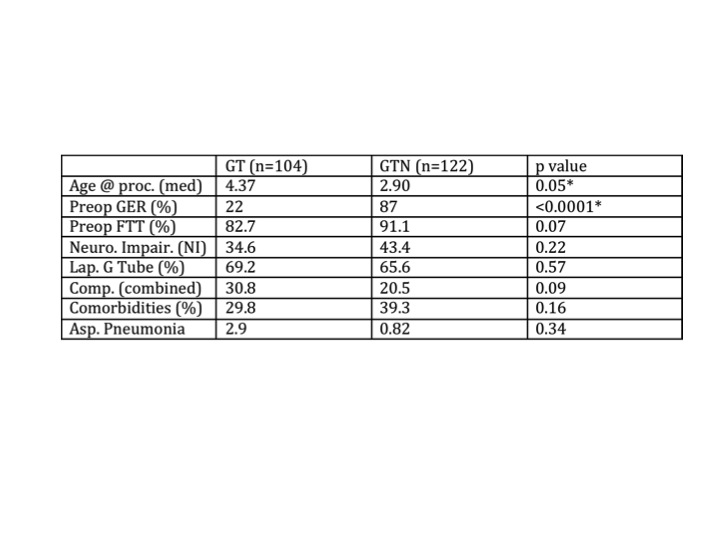K. A. Nestor1, S. Larson1, J. A. Taylor1, D. W. Kays1, S. Islam1 1University Of Florida College Of Medicine,Pediatric Surgery,Gainesville, FL, USA
Introduction: There is controversy regarding the need for an antireflux procedure in infants who require feeding access. A Cochrane review on this topic noted a lack of evidence and recommended further studies. The purpose of this report was to assess outcomes in infants who underwent a gastrostomy alone vs. gastrostomy plus fundoplication.
Methods: A retrospective review of all neonates and infants who had a gastrostomy placed at a single institution from 2009-2014 was conducted. Demographics, comorbidities, hospital course, procedure, and outcomes were recorded. The cohort was then divided into gastrostomy and gastrostomy plus fundoplication. Main outcome variable was need for further antireflux procedures.
Results: There were 226 cases – 104 gastrostomy and 122 with fundoplication. The cohorts were similar in gender, gestational age, race, weight, median age, LOS, and proportion neurologically impaired. Preoperative diagnosis of reflux was significantly higher in the fundoplication cohort (22 vs. 87%). There was a trend to increased overall complications in the gastrostomy group (31 vs. 20%), including minor issues. Postoperative need for antireflux medications was significantly increased for gastrostomy patients compared to preoperative use (p=0.01). Readmission for respiratory issues or aspiration events was equivalent (Table). Post-op reflux requiring a fundoplication or GJ tube was noted in 21/104 gastrostomy cases (25%), and compared to the remaining gastrostomy patients (n=83), the incidence of neurologic impairment, type of feeds, and age at surgery, were similar.
Conclusion: There was a high rate of reflux in patients who had a gastrostomy alone with a significant number requiring a secondary antireflux procedure, despite the ‘high-risk’ patients undergoing a fundoplication already. These results suggest that a more liberal use of concomitant fundoplication may be justified in these patients.
